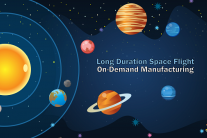Mechanical Engineering Assistant Professor receives $1.6M NASA grant to develop in-space manufacturing methods and materials
Mon, 05/10/2021 - 11:47amDr. Jonathan Raush, Assistant Professor of Mechanical Engineering and Associate Director of the Institute for Materials Research and Innovation (IMRI), has received a $1.6M grant from NASA and the Louisiana Board of Regents to support the development of In-Space Manufacturing methods and materials.
With the on-going success of the Perseverance mission receiving significant attention, and with planning well underway for future manned visits to Mars and prolonged Lunar stays, the need for a robust in-space manufacturing (ISM) capability to support long duration spaceflight is becoming ever more apparent, and urgent. Sustainable, long-duration human spaceflight missions require on-demand manufacturing capabilities that provide solutions for fabrication and repair of components, electronics, consumables, tools, and structures that are impossible to carry along in flight.
Led by Dr. Jonathan Raush, the project will develop a 3-D printing process for generating replacement parts and tools from lightweight aerospace alloys. IMRI has extensive resources and experience in materials testing, characterization, and simulation, and will be teaming up with faculty from Louisiana State University and the University of Alabama to develop this novel system.
The research will integrate advanced experimental methods and computational models to develop and optimize both the materials and processes. Processing metal alloys in a micro-gravity environment requires the development of specialized methods and the adaptation of physics-based models to account for gravitational effects. A significant advance will be the modeling of processing methods, such as sintering, in a micro-gravity environment, for optimizing procedures and maximizing performance.

